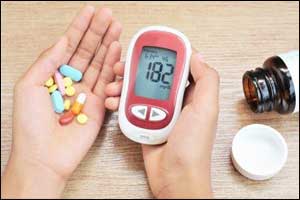- Home
- Editorial
- News
- Practice Guidelines
- Anesthesiology Guidelines
- Cancer Guidelines
- Cardiac Sciences Guidelines
- Critical Care Guidelines
- Dentistry Guidelines
- Dermatology Guidelines
- Diabetes and Endo Guidelines
- Diagnostics Guidelines
- ENT Guidelines
- Featured Practice Guidelines
- Gastroenterology Guidelines
- Geriatrics Guidelines
- Medicine Guidelines
- Nephrology Guidelines
- Neurosciences Guidelines
- Obs and Gynae Guidelines
- Ophthalmology Guidelines
- Orthopaedics Guidelines
- Paediatrics Guidelines
- Psychiatry Guidelines
- Pulmonology Guidelines
- Radiology Guidelines
- Surgery Guidelines
- Urology Guidelines
No more hypoglycemia: Scientists Develop first glucose-responsive insulin

Taking too much insulin or other diabetes medications could result in hypoglycemia (dangerously low blood sugar levels) in diabetics. The researchers at the University of Bristol have developed a new synthetic glucose binding molecule platform that could eliminate this risk. The development brings one step closer to the development of the world's first glucose-responsive insulin which could transform the treatment of diabetes. The study appears in the journal Nature Chemistry.
The World Health Organization estimate that over 382 million people worldwide, have diabetes - a metabolic disorder affecting blood sugar levels. Everyone with Type 1 diabetes and some people with Type 2 diabetes needs to take insulin, either by injection or a pump, to control their blood glucose levels.
A research team led by Professor Anthony Davis, School of Chemistry, in conjunction with spin-out company Ziylo, have developed an innovative technology platform, which could be a key component to enable the next generation of insulin, able to react and adapt to glucose levels in the blood. This could eliminate the risk of hypoglycemia - dangerously low blood sugar levels - leading to better metabolic control for people living with the disease.
Earlier this year Ziylo was bought by global healthcare company Novo Nordisk in a deal which was worth around $800 million - the biggest deal of its kind in the history of the University of Bristol.
"For many years we have been trying to design a molecule which binds glucose strongly and selectively in its natural environment (water), said Professor Davis.
"Until recently we had achieved some success, but never sufficient for practical applications. Now we have made a design change and finally solved the problem.
"Indeed, our new molecule performs better than anyone would have thought possible. It binds glucose 100 times more strongly than any of our previous efforts and is almost perfectly selective for its target. It is fully comparable with the natural molecules that bind glucose, despite being many times smaller."
There are good prospects for using the synthetic receptor to help diabetics.
Firstly, it could be the key to developing glucose-responsive insulin - insulin which becomes inactive when glucose is not present. This could free diabetics from the fear of hypoglycemia, where glucose levels sink to dangerously low levels.
Secondly, it could be used in continuous glucose monitors, which would allow diabetics to know their glucose levels at all times.
Professor Davis added: "On a scientific level, we have shown that small synthetic molecule can match the performance of evolved natural molecules (proteins), even when the task is unusually difficult (the selective binding of glucose in water has always been thought to be exceptionally challenging).
"After so many years trying, it is fantastic that we have made something that could save so many lives."
For further reference log on to https://doi.org/10.1038/s41557-018-0155-z

Disclaimer: This site is primarily intended for healthcare professionals. Any content/information on this website does not replace the advice of medical and/or health professionals and should not be construed as medical/diagnostic advice/endorsement or prescription. Use of this site is subject to our terms of use, privacy policy, advertisement policy. © 2020 Minerva Medical Treatment Pvt Ltd